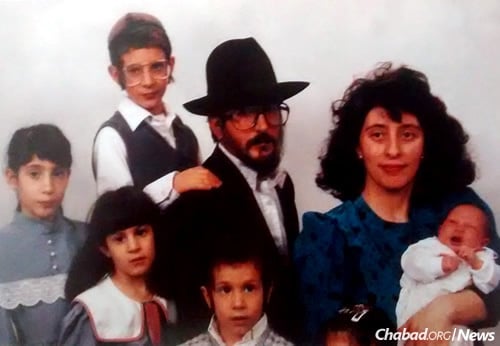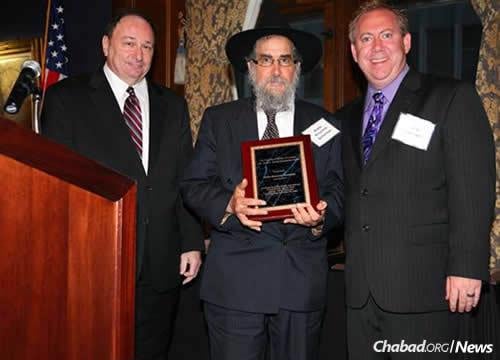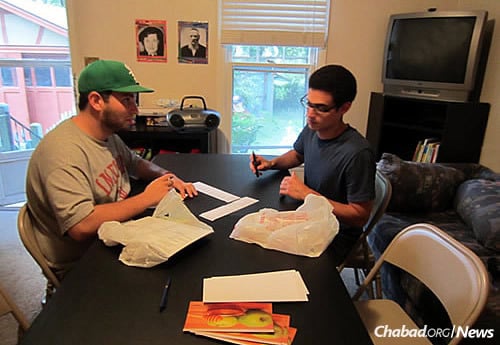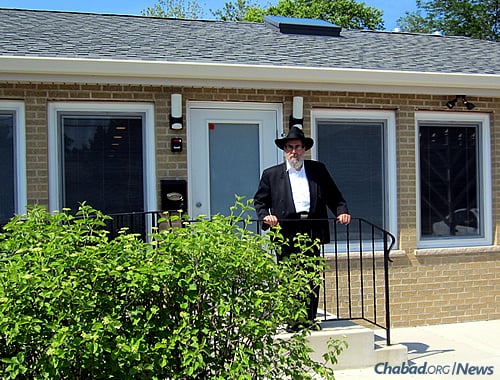Growing up in a modest townhouse northwest of Chicago, the eight Scheiman children never asked the stories behind the haggard men and women who would join their family for the Passover seder and Shabbat meals throughout the year.
“We never even thought about the fact that most of them had recently come out of jail,” says Rabbi Mendel Scheiman, who now co-directs Chabad of Southern Illinois University (SIU) in Carbondale, Ill., with his wife, Yochi. “That’s just the way it was. Our parents invited them in, and we never thought twice.”
Now, the rabbi and two of his brothers have all caught their father’s “prison bug,” serving the spiritual needs of Jewish people behind bars all over the state of Illinois.
“I began visiting prisoners back in 1980,” says Rabbi Binyomin Scheiman, a man of small stature with a legendary big heart. “These were people who needed to be helped, and I was the right person at the right time.”
The rabbi says that his inspiration comes from the Rebbe, Rabbi Menachem M. Schneerson, of righteous memory.
“The Rebbe charged us to reach out to all Jews—including those on the periphery, those who are often overlooked,” says Scheiman, who began his work in Illinois after receiving the Rebbe’s blessing and would regularly report to the Rebbe on his activities. “The Rebbe spoke about the great spiritual stature of the souls that are tasked to go into the deepest, darkest places, and there are fewer places darker than prison.”
And so he began criss-crossing the Midwestern state, stopping to visit every Jewish person behind bars at least once a month.

Former inmate Neil Katov attests that “when I went to prison for 30 months, the rabbi came every month to see me. I was the only Jew there, and I have no family. He made me feel that no matter where I went, I had a Jewish family.”
Throughout the years, the rabbi has worked closely with the staff at the Florida-based Aleph Institute, which was founded at the direction of the Rebbe in 1981 to provide for the spiritual and physical needs of Jewish soldiers and prisoners and their families throughout the United States.
Scheiman would often be gone from home for most of the week as he drove around Illinois visiting his scattered flock. All the while, he continued to serve as a Chabad emissary to Niles, a middle-class suburb not far from Chicago’s O’Hare Airport.
‘Embrace Their Future’
Much of the burden of caring for their large family fell on the shoulders of his wife, Hinda, who opened her home to the many former inmates her husband would keep in touch with once they were free.
“Not everyone would be comfortable with that,” Rabbi Daniel Moscowitz, the late regional director of Lubavitch Chabad of Illinois, once remarked. “But Mrs. Scheiman took that as a matter of fact—welcoming them and helping them embrace their future.”
“I was honored to come to his house, meet his family and share the Sabbath,” says a woman who had been visited by the rabbi throughout her 13-year prison stay. “It had been a long time since I had a sit-down meal. The family was so welcoming, warm, heartfelt and so genuine. To see the rabbi in a different setting and not just on the other side of a bare table . . . I am honored and blessed and thankful.”
Recognizing that there was more work than what he and his wife were doing, the rabbi approached his sons Chaim and Mendel, both newly married ordained rabbis living in Brooklyn, N.Y., to see if they would consider moving to Illinois to join him in his work.
As they made plans for the expansion of what was then called JPAF (the Jewish Prisoners Assistance Foundation), Mrs. Scheiman lay in a hospital bed battling for her life. She passed away in the spring of 2013.
Months later, the two young rabbis and their budding families moved back to their home state, joining their father at the newly formed HINDA (Helping INDividuals Ascend) Institute, a tribute to the woman whose good cheer and faith had been the backbone of her husband’s work.
Mendel and Yochi Scheiman moved to Carbondale, a small city in the south of the state. In addition to serving an estimated 300 Jewish students at Southern Illinois University, they have taken responsibility for the inmates in the 12 federal and state prisons that dot the area.

Their two constituencies—those on the inside and those on the outside—have interacted in interesting ways. The students often write letters and prepare holiday packages to be mailed to prisoners.
Many have even struck up pen-pal correspondences. “My pen pal never had a family, and has been thankful for the connection to the world and someone to correspond with,” says Herb Lukes, a native of Highland Park, Ill., who is studying finance at SIU. “We make sure to write at least once a month.”
‘The Humanity of the Individual’
At the same time, Rabbi Chaim Scheiman and his wife, Chaya Mushka, began working with people incarcerated in Cook County Jail (by way of which most Chicago-area offenders enter the penal system) and with those outside the prison.
Today, the couple is busy keeping in touch with ex-offenders as they find their way back into society, as well as serving the needs of the families of those behind bars. The rabbi learns Torah with more than three-dozen individual ex-offenders every week.

“Our main work is re-entry,” says Chaya Mushka Scheiman. “More than anything else, someone re-entering society needs to know that there is someone who cares for them and will be there for them no matter what.”
She points out the rate of recidivism among ex-offenders who remain in touch with them is at an astonishingly low 10 percent. “Through constant contact, were able to help them stay focused on living a clean, crime free life,” she says, “Just that regular phone call from an understanding human being makes all the difference.”
She notes that some of their success can be attributed to the considerable work they do with the parents, siblings, and children of incarcerated people, holding conference calls where people can share struggles, tips, and support among people going through similar challenges.
A native of Montreal, Canada, who had no prior association with the world of prison, she says it was difficult for her to acclimate to working with people who had done wrong. “My father-in-law taught me a lot,” she says, “including how to separate the person from the crime, and view them as an individual in need of help and rehabilitation.”
At the same time, she says that the job requires more than just love and understanding. Citing the example of a the negative experience she had with a troubled young woman who actually lived in her apartment during a brief break between prison sentences, she says she has learned to say “no” and to be firm with the guidance she gives.
Since the parents of incarcerated people tend to be elderly, she says her work has also grown to include guiding people through the confusing choices and emotions that come with the end of life, which are compounded by the fact that their children are not there to support them.

Meanwhile, the eldest Scheiman son, Rabbi Schneur Scheiman, remained devoted to his work directing Camp Gan Israel and other programs for children in the Chicago area.
Recently, however, his father asked him to begin visiting 11 prisons in the state, which takes approximately three days a month. “I wasn’t sure how I would do it,” says his son. “Initially, when going with my father for training, I was overwhelmed by all the paperwork, the visits in a maximum-security prison and everything else that comes along with spending time with people who have done something wrong. After getting into it, though, I have to admit that I enjoy it and feel good doing it. I feel like it complements my other work. Putting tefillin on that Jew who everyone else tries to ignore helps you to appreciate the neshamah—the soul that each person has.”
Their work has extended beyond inmates. “I consider Rabbi Binyomin Scheiman my friend, my rabbi and my mentor,” says Stephen C. Keim, chief of chaplains for the Illinois Department of Corrections. “I’ve been to his home for many celebrations, and now I often go to his children, Mendel and Yochi in Carbondale.”
According to Keim, the rabbi is unique among chaplains in that he “makes time for everyone.”
“He is so very accessible and willing to speak to everyone, whether they are Jewish or not,” says Keim. “He takes the time to explain the Noahide Laws, and provides them with literature and resources. He is very much willing to go out of his way to be helpful to anyone looking for direction and spiritual guidance. He’ll acknowledge the humanity of the individual and their questioning, and that’s very special in the prison environment.”
Even with the additional manpower, the elder Rabbi Scheiman, who recently celebrated his 60th birthday, has no plans to slow down.
“It used to be that I would struggle to care for everyone and everything. With all that going on, it was inevitable that things would fall through the cracks,” he acknowledges. “Now we are able to do so much more—and do it all so much better.”













Join the Discussion